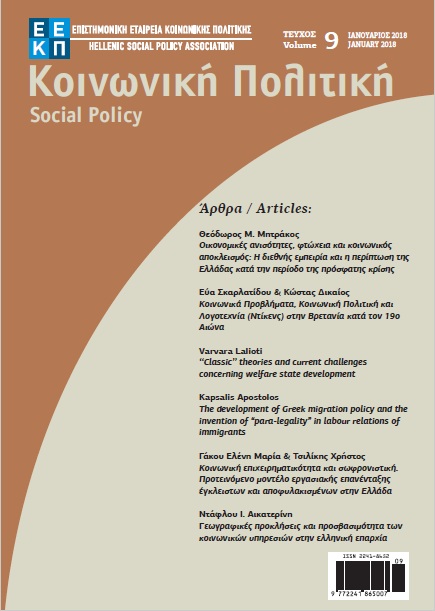Social Problems, social Policy and Literature (Dickens) in 19th Century Britain
Abstract
The article aims to relate literature (Charles Dickens for that matter) to social problems and social policy decisions in 19th century Britain. It initially examines the question regarding of reading literature via a ‘political’ lens, and then turns to present Ch. Dickens’s biography and
work-titles. The article then turns its focus to ‘industrial revolution’, the conditions of life and work during the era, alongside an examination of key legislation relevant. It then attempts its main pursuit, that is a reading of ‘Oliver Twist, ‘Hard Times’ and ‘Great Expectations’ through
a political viewpoint. It finds overall elements and pin-points extracts showing Dickens’s both latent and explicit political and social concerns, and concludes that he (alongside other authors) can and should be read having questions of politics and social policy in mind.
The article aims to relate literature (Charles Dickens for that matter) to social problems and social policy decisions in 19th century Britain. It initially examines the question regarding of reading literature via a ‘political’ lens, and then turns to present Ch. Dickens’s biography and work-titles. The article then turns its focus to ‘industrial revolution’, the conditions of life and work during the era, alongside an examination of key legislation relevant. It then attempts its main pursuit, that is a reading of ‘Oliver Twist, ‘Hard Times’ and ‘Great Expectations’ through a political viewpoint. It finds overall elements and pin-points extracts showing Dickens’s both latent and explicit political and social concerns, and concludes that he (alongside other authors) can and should be read having questions of politics and social policy in mind.
Article Details
- How to Cite
-
Δικαίος Κ., & Σκαρλατίδου Ε. (2018). Social Problems, social Policy and Literature (Dickens) in 19th Century Britain. Social Policy, 9, 25–46. https://doi.org/10.12681/sp.15984
- Issue
- Vol. 9 (2018)
- Section
- Articles

This work is licensed under a Creative Commons Attribution 4.0 International License.
Authors who publish with this journal agree to the following terms:
Authors retain copyright and grant the journal right of first publication with the work simultaneously licensed under a Creative Commons Attribution Non-Commercial License that allows others to share the work with an acknowledgement of the work's authorship and initial publication in this journal.
Authors are able to enter into separate, additional contractual arrangements for the non-exclusive distribution of the journal's published version of the work (e.g. post it to an institutional repository or publish it in a book), with an acknowledgement of its initial publication in this journal.
Authors are permitted and encouraged to post their work online (preferably in institutional repositories or on their website) prior to and during the submission process, as it can lead to productive exchanges, as well as earlier and greater citation of published work.



